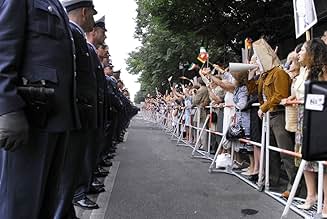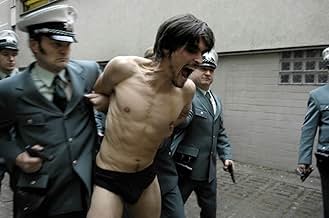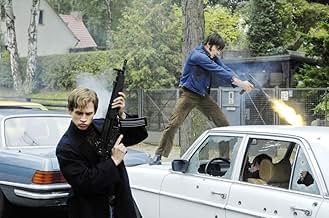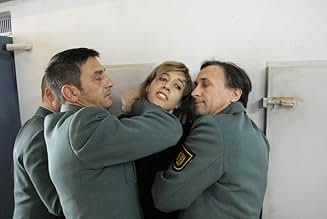CALIFICACIÓN DE IMDb
7.3/10
41 k
TU CALIFICACIÓN
El grupo terrorista alemán, The Red Army Faction, organizó bombardeos, robos, secuestros y asesinatos a finales de los sesenta y setenta.El grupo terrorista alemán, The Red Army Faction, organizó bombardeos, robos, secuestros y asesinatos a finales de los sesenta y setenta.El grupo terrorista alemán, The Red Army Faction, organizó bombardeos, robos, secuestros y asesinatos a finales de los sesenta y setenta.
- Dirección
- Guionistas
- Elenco
- Nominado a 1 premio Óscar
- 4 premios ganados y 22 nominaciones en total
Niels-Bruno Schmidt
- Jan Carl Raspe
- (as Niels Bruno Schmidt)
Hans Werner Meyer
- Klaus-Rainer Röhl
- (as Hans-Werner Meyer)
- Dirección
- Guionistas
- Todo el elenco y el equipo
- Producción, taquilla y más en IMDbPro
Opiniones destacadas
Being aged, knowing most about the R.A.F story from the news when it happened (1970s) including the events in 1968 (Berlin, Prague , Mexico , U.S.A.) I am much more disappointed in this " big production' on a major theme in post war German (European) history, than most other critics up till now. If you know little or nothing about the subject, like many younger people, this may seem a " cool movie". Just as an action pic, you're right. However, what I miss, is the ideological context in which all this was happening. There is some mention of sectarian leftist groups, we see major mass protests of university students, etc. And the starting scenes in Berlin (visit of Sjah) are the main " background" to the " movement". (by the way, how many under 30 people knew about the Sjah of Persia, anyway? I even remember first spouse Soraya from the early 60's...). What I miss, is , an explanation of what and how on the mass student meetings, they are just shown. Also missing are the deeper context of postwar BRD (Germany) not having come to terms with the Nazi past, especially in the situation of many former NSDAP - symp's having high places in society, government, industry, etc. As I remember, that was one of the main frustrations in leftist circles ( and not only there...). Etcetera. In this respect, seeing the first gen. members of R.A.F. speeding to an unexplained action in BMW's on the " autobahn" as if they were fun-cruising L.A. in a Tarantino muscle-car flic while having My Generation by the Who on the stereo this all is quite unbelievable for people informed about that era. I don't believe these guys were jet-set-emulators. Jet-set was capitalist and thus their opposite social stratum. Which they fought , with all fatal results. And, why the story ending with the death of the first four, how shocking it may be? This whole episode is too much for one movie. As a Dutch proverb says: " they took too much hay on their fork". (meaning the makers of B.M. Komplex). genomen".
I wish to clear up any mistake my summary for this might lead to: This is not poorly done. As for this being good or not, that is perhaps a little more subjective, as it may depend on your opinion of the RAF. This is another of the German films of recent years dealing with awful national situations of theirs, from a couple, to numerous, decades back. Whether it's therapeutic, apologetic, a third option or a mix of several that drives this trend, is up for debate. I find this and Der Untergang(or "Downfall") to be exceptionally well-done. As was also the case with that one, this requires you to pay close attention. The pace comes about as close to being outright overpowering - for two and a half hours straight, mind you - as it can, without crossing the line into it. This does also somewhat expect you to be familiar with the overall occurrences, otherwise, you may be confused and have trouble keeping track and following it. This is rather intense. It is a quite strong piece. Featured is an immense amount of violence, which is often graphic. The attitude towards nudity and sexuality is very relaxed. This is disturbing. It is by no means for the faint of heart, and mainstream audiences, if they give this a chance, should not expect it to be "enjoyable", in the traditional sense. It is not "funny". It is powerful. The cinematography and editing are excellent. The acting performances are beyond reproach. I don't know all the facts, but I understand that this isn't completely historically accurate, though it seems to come fairly close. The production values are incredible. I recommend this to anyone interested in an authentic drama based on the Rote Armee Fraktion. 8/10
I agree with the other comments on the following points: the film does indeed concentrate on the culprits and their actions in a documentary way (as opposed to an interpretation of the RAF's ideas and motivations from a clear-cut political standpoint). Although the victims DO appear they are not characterized more closely; the only representative of the state is Horst Herold (head of the BKA), politicians do not show up at all, the media appear only in the shape of Springer, konkret and Spiegel and even the lawyers (Haag, Croissant, Schily, Ströbele, etc.) are merged into only one (fictitious?) character. I for one do agree with this approach and if you are prepared for it you probably can live with it too. In any case, despite all the chases, shootouts and explosions it hasn't become a mere action-film.
What's more problematic is that the film follows the book by Stefan Aust VERY closely. Therefore the dramaturgy is more similar to "real life" than to a classical feature film (e.g. there are many changes in pace, several climaxes are distributed over the course of the film and a proper arc of suspense is somewhat missing). "Fortunately" real life offered a culmination of events with the Schleyer kidnapping in the "German Autumn" 1977, so that the film ends in a reasonably satisfying way. Nevertheless the end credits come a little abruptly.
The second problem is that the film tries to show virtually ALL events from the book (only some minor incidents like the Mahler detention, Peter Urbach, the burglaries in registration offices in order to steal blank passports or the visit of Jean-Paul Sartre in Stammheim are missing) so that it needs to squeeze 10 years of history into 140 minutes. The result is a film with breakneck speed at some points. The better scenes (e.g. the training camp in Jordan or the lawsuit in Stammheim) are obviously those where the film catches breath, calms down and takes its time for the actors to shine.
The quality of the acting ranges from good to fantastic (with very few exceptions like Alexandra Maria Lara, who is nothing more than wide-eyed again and who thankfully doesn't even have dialogue). Especially Martina Gedeck and Johanna Wokalek are sensational. It is THEIR film and the conflicts in Stammheim which led to Meinhof's suicide are acted Oscar-worthy. But Michael Gwisdek (Ensslin's father), Jan Josef Liefers (Peter Homann), Sebastian Blomberg (Rudi Dutschke), Nadja Uhl (Brigitte Mohnhaupt) and Hannah Herzsprung (Susanne Albrecht) are also very good.
The production values are excellent too. A lot of locations, a great deal of main and supporting roles, hundreds of extras, good special effects (mainly explosions) and a set design and costume design which creates a very coherent 70's atmosphere: you can see that the film cost a lot of money. Every cent is on the screen.
I didn't like the choice of music that much. Deep Purple's "Child in Time" is always great to hear, but the rest (Janis Joplin, The Who, Bob Dylan) is just too mainstreamy and unimaginative for my taste (but probably also very expensive). Why not use MC5, Ton Steine Scherben or Ennio Morricone's "Vamos a matar, companeros"?
Now I'm looking forward to the reactions and reviews from other countries, who probably don't know this part of German history very well. In the US I expect the criticism that there are too many naked people, too many swear words and even more cigarettes (every one in BMK smokes everywhere and at all times), in order to distract from the politics of the film ;-) "Der Baader Meinhof Komplex" isn't the masterpiece on the history of the first generation of the RAF that I had hoped for in my comments on "Todesspiel", but altogether it is a very suspenseful, fascinating, densely narrated and well acted film. Hopefully it will not be the last word on the subject, but it succeeds in giving the audience the basic RAF knowledge on which future (less neutral, more opinionated) movies can build their stories.
What's more problematic is that the film follows the book by Stefan Aust VERY closely. Therefore the dramaturgy is more similar to "real life" than to a classical feature film (e.g. there are many changes in pace, several climaxes are distributed over the course of the film and a proper arc of suspense is somewhat missing). "Fortunately" real life offered a culmination of events with the Schleyer kidnapping in the "German Autumn" 1977, so that the film ends in a reasonably satisfying way. Nevertheless the end credits come a little abruptly.
The second problem is that the film tries to show virtually ALL events from the book (only some minor incidents like the Mahler detention, Peter Urbach, the burglaries in registration offices in order to steal blank passports or the visit of Jean-Paul Sartre in Stammheim are missing) so that it needs to squeeze 10 years of history into 140 minutes. The result is a film with breakneck speed at some points. The better scenes (e.g. the training camp in Jordan or the lawsuit in Stammheim) are obviously those where the film catches breath, calms down and takes its time for the actors to shine.
The quality of the acting ranges from good to fantastic (with very few exceptions like Alexandra Maria Lara, who is nothing more than wide-eyed again and who thankfully doesn't even have dialogue). Especially Martina Gedeck and Johanna Wokalek are sensational. It is THEIR film and the conflicts in Stammheim which led to Meinhof's suicide are acted Oscar-worthy. But Michael Gwisdek (Ensslin's father), Jan Josef Liefers (Peter Homann), Sebastian Blomberg (Rudi Dutschke), Nadja Uhl (Brigitte Mohnhaupt) and Hannah Herzsprung (Susanne Albrecht) are also very good.
The production values are excellent too. A lot of locations, a great deal of main and supporting roles, hundreds of extras, good special effects (mainly explosions) and a set design and costume design which creates a very coherent 70's atmosphere: you can see that the film cost a lot of money. Every cent is on the screen.
I didn't like the choice of music that much. Deep Purple's "Child in Time" is always great to hear, but the rest (Janis Joplin, The Who, Bob Dylan) is just too mainstreamy and unimaginative for my taste (but probably also very expensive). Why not use MC5, Ton Steine Scherben or Ennio Morricone's "Vamos a matar, companeros"?
Now I'm looking forward to the reactions and reviews from other countries, who probably don't know this part of German history very well. In the US I expect the criticism that there are too many naked people, too many swear words and even more cigarettes (every one in BMK smokes everywhere and at all times), in order to distract from the politics of the film ;-) "Der Baader Meinhof Komplex" isn't the masterpiece on the history of the first generation of the RAF that I had hoped for in my comments on "Todesspiel", but altogether it is a very suspenseful, fascinating, densely narrated and well acted film. Hopefully it will not be the last word on the subject, but it succeeds in giving the audience the basic RAF knowledge on which future (less neutral, more opinionated) movies can build their stories.
Although being somewhat more than moderately interested in politics, I knew very little about the original activities on which this film is based. Having seen the film, I now feel vastly more knowledgeable on how world events in the late sixties and early seventies led from the emergence to the demise of this particular left wing faction. My attention was fully engaged throughout the film. I thought the screenplay brilliantly portrayed the way the mindset of the RAF developed as they became more and more convinced they were living in a police state. Acting and direction were superb throughout. In spite of the violence and repression being depicted, I was reassured by the fact that such thought provoking films can and are being made for today's cinema audiences. After seeing Die Welle (I think it was three times) earlier this year I am now very enthusiastic about German cinema and shall certainly be hoping to see Der Baader Meinhof Komplex at least once more on the big screen this year. A masterpiece of political film making. Highly recommended.
I liked this film primarily of how much it seemed to buck the formulaic American plot system. Don't get me wrong some American movies are cool, but they mostly all adhere to the same boring standards.
This film was incredibly bleak and honest, which I respected very much. Also it required that you think for yourself and develop your own opinions.
The plot revolves around a group of young people who go out to try to make a difference and yet don't really accomplish anything at all. I can't give away too much but I thought this was just beautiful and complex film-making. Very intelligent, it never tried to be cute or force any ideas on you, it simply was.
I know this is a vague review, but if you feel like seeing an intelligent complex drama then you must see this. Go German cinema!
This film was incredibly bleak and honest, which I respected very much. Also it required that you think for yourself and develop your own opinions.
The plot revolves around a group of young people who go out to try to make a difference and yet don't really accomplish anything at all. I can't give away too much but I thought this was just beautiful and complex film-making. Very intelligent, it never tried to be cute or force any ideas on you, it simply was.
I know this is a vague review, but if you feel like seeing an intelligent complex drama then you must see this. Go German cinema!
¿Sabías que…?
- TriviaAs an immediate reaction to the movie, Ignes Ponto, widow of Jürgen Ponto, whose assassination is portrayed in the movie, returned her Federal Cross of Merit. She was angry that the Federal Republic of Germany has never even created a memorial for victims of the RAF, but instead helped to finance films like this one about the members of the RAF. Also, she said, she had not been warned about the graphic portrayal of Ponto's assassination when she was invited to the movie premiere and felt humiliated by the producers for making her sit through this without a warning. About a month later, she filed a lawsuit against the producers, who claimed that every scene is historically accurate, because the assassination of her husband, which she had to witness from the next room, was not portrayed as it happened. She demands the scene of the murder of her husband be cut from the movie. The filmmakers claim that they had tried to contact her during production to get the scene right but she had no desire to cooperate. Before this movie, there had been no portrayal of Ponto's assassination on film and she felt the staging of the movie was lurid and dishonoring to her husband. As of this writing, no decision has been reached about the lawsuit.
- ErroresUlrike Meinhof's twin daughters Bettina and Regine first appear in the opening scene in 1967 when they are 9 years old. Yet 3 years later when living in Sicily and rescued by Stefan Aust, they haven't aged at all.
- Citas
Ulrike Meinhof: If you throw a stone, it's a crime. If a thousand stones are thrown, that's political. If you set fire to a car it's a crime; if a hundred cars are set on fire that's political.
- ConexionesFeatured in Guinness World Records - Die größten Weltrekorde: Episode #5.1 (2008)
- Bandas sonorasMercedes Benz
Written by Janis Joplin, Michael McClure
Performed by Janis Joplin
Produced by Paul A. Rothchild
Selecciones populares
Inicia sesión para calificar y agrega a la lista de videos para obtener recomendaciones personalizadas
Detalles
- Fecha de lanzamiento
- Países de origen
- Sitio oficial
- Idiomas
- También se conoce como
- The Baader Meinhof Complex
- Locaciones de filmación
- Productoras
- Ver más créditos de la compañía en IMDbPro
Taquilla
- Presupuesto
- EUR 20,000,000 (estimado)
- Total en EE. UU. y Canadá
- USD 476,270
- Fin de semana de estreno en EE. UU. y Canadá
- USD 17,348
- 23 ago 2009
- Total a nivel mundial
- USD 26,937,355
- Tiempo de ejecución2 horas 30 minutos
- Color
- Mezcla de sonido
- Relación de aspecto
- 1.85 : 1
Contribuir a esta página
Sugiere una edición o agrega el contenido que falta

Principales brechas de datos
By what name was Der Baader Meinhof Komplex (2008) officially released in India in Hindi?
Responda




































